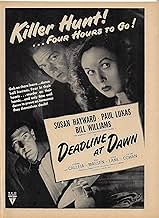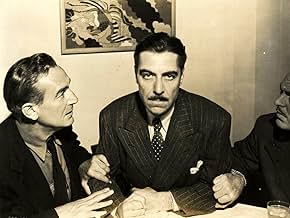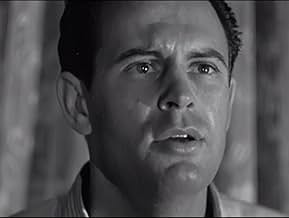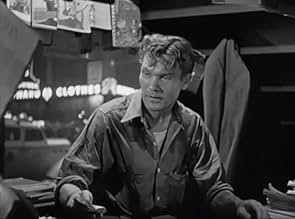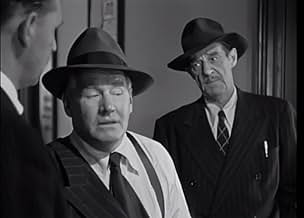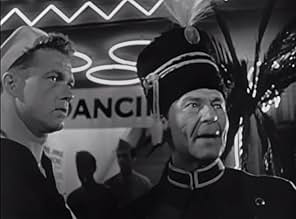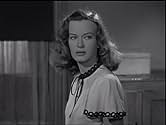NOTE IMDb
6,8/10
2,5 k
MA NOTE
Le dernier jour de sa permission à New-York, un jeune marin se réveille avec une grosse somme d'argent en poche. Il l'a pris chez une femme avec laquelle il a bu, mais ne se souvient plus de... Tout lireLe dernier jour de sa permission à New-York, un jeune marin se réveille avec une grosse somme d'argent en poche. Il l'a pris chez une femme avec laquelle il a bu, mais ne se souvient plus de rien.Le dernier jour de sa permission à New-York, un jeune marin se réveille avec une grosse somme d'argent en poche. Il l'a pris chez une femme avec laquelle il a bu, mais ne se souvient plus de rien.
- Réalisation
- Scénario
- Casting principal
- Récompenses
- 1 nomination au total
Ernie Adams
- Waiter
- (non crédité)
Fred Aldrich
- Beefy Nightclub Guest
- (non crédité)
Walter Bacon
- Commuter
- (non crédité)
John Barton
- One-Legged Man
- (non crédité)
Billy Bletcher
- Waiter
- (non crédité)
Avis à la une
A decent story based on a novel by Cornell Woolrich, good performances, and snappy dialogue by Clifford Odets elevate "Deadline at Dawn" from 1946. A small film, clocking in at 83 minutes, it packs in a lot of drama.
The film begins with a blind man (Marvin Miller, Mr. Anthony from "The Millionaire") visiting a young woman and demanding $1400 that he is owed. Next thing you know, she's dead.
A young sailor on leave, Alex, (Bill Williams) sobers up after a blackout and sees that he has a lot of money that belonged to one Edna Bartelli (Lola Lane), a girl who invited him to her home to "fix her radio."
Alex has the radio, and at a dime a dance place, he asks for help from June Goth (Susan Hayward) to help him return it. When they get to Edna's, she's dead. Alex is afraid that he did it, but he can't remember.
His leave ends in four hours, so that's all they have to find out what happened. They team up with a friendly cab driver (Paul Lukas). In their investigation, they meet a bunch of low-lifes and it becomes apparent that Edna had a few enemies.
Both Hayward and Williams give delightful performances. Hayward vacillates from the tough girl she is at the dance hall and softness as she gets to know Alex. Williams, who was TV's Kit Carson is the dad of actor William Katt ("Greatest American Hero") and the husband of Perry Mason's Barbara Hale.
True to its New York City wee small hours of the morning scenario, the film is peppered with various actors, each with his or her own story: Joseph Calleia, Osa Massen, Stephen Geray, Roman Bohen, and Constance Worth.
Harold Clurman, a theater director, directed this with an excellent idea of what it's like to be in New York City in the summer - hot, and the weirdos who come out at night.
Very entertaining, though probably too ambitious given the budget and time frame. The ending is a little convoluted.
The film begins with a blind man (Marvin Miller, Mr. Anthony from "The Millionaire") visiting a young woman and demanding $1400 that he is owed. Next thing you know, she's dead.
A young sailor on leave, Alex, (Bill Williams) sobers up after a blackout and sees that he has a lot of money that belonged to one Edna Bartelli (Lola Lane), a girl who invited him to her home to "fix her radio."
Alex has the radio, and at a dime a dance place, he asks for help from June Goth (Susan Hayward) to help him return it. When they get to Edna's, she's dead. Alex is afraid that he did it, but he can't remember.
His leave ends in four hours, so that's all they have to find out what happened. They team up with a friendly cab driver (Paul Lukas). In their investigation, they meet a bunch of low-lifes and it becomes apparent that Edna had a few enemies.
Both Hayward and Williams give delightful performances. Hayward vacillates from the tough girl she is at the dance hall and softness as she gets to know Alex. Williams, who was TV's Kit Carson is the dad of actor William Katt ("Greatest American Hero") and the husband of Perry Mason's Barbara Hale.
True to its New York City wee small hours of the morning scenario, the film is peppered with various actors, each with his or her own story: Joseph Calleia, Osa Massen, Stephen Geray, Roman Bohen, and Constance Worth.
Harold Clurman, a theater director, directed this with an excellent idea of what it's like to be in New York City in the summer - hot, and the weirdos who come out at night.
Very entertaining, though probably too ambitious given the budget and time frame. The ending is a little convoluted.
When a blind ex-husband wearing a boutonnière shows up late in the evening demanding $1400, a good night is probably not in store. Especially when his former spouse's drunken excuse for not paying is "that sailor" must have stolen it. Thus begins Deadline at Dawn, an early noir that's not only a taut and agreeably complicated little mystery but that also aspires, and largely succeeds, in constructing an urban microcosm.
The sailor (Bill Williams) on shore leave has, as sailors on leave do, drunk too much, gambled away his money, been lured up to a wicked woman's apartment, and fallen into a blackout. (The movie's based on a novel by Cornell Woolrich, writing as William Irish, who knew whereof he wrote.) When he climbs back out, thanks to black coffee supplied by a kindly newsie, $1400 tumbles out of his pocket.
Trying to piece together the evening, he strays into a dime-a-dance palace, where he meets a would-be hard case (Susan Hayward in her 24th movie!). Making small talk with his bored-to-the-bone partner, Williams speculates whether a rainstorm might break the heat wave. "Such things have been known to happen," replies Hayward, thereby lowering the thermometer pronto. (The quirky, bristling dialogue by Clifford Odets is one of the many amenities of Deadline at Dawn.) Of course, Hayward inevitably thaws enough to offer counsel to Williams and serve as sidekick in his quest to make amends (he's a square-rigger right out of one of the square states). They return to the robbed woman's apartment only to find her (Lola Lane) dead. It's unclear to the befuddled Williams, and to Hayward, whether he might indeed have been the culprit. Trouble is, he's taking a 6 a.m. bus back to Norfolk, where he's stationed; there's only a few hours left to clear his conscience or fess up to the police.
An immigrant cabbie (Paul Lukas) improbably volunteers as a third ally, and the three, together and separately, embark on various sleuthing expeditions through the dark and soupy streets of Manhattan. For a movie that clocks in under an hour and a half, Deadline at Dawn boasts a cast just short of epic. Among the principals who intersect are Joseph Calleia, as a ruthless yet debonair gangster; Osa Massen as a lame housewife expelled from the rubble of Europe; and Steven Geray as a well-mannered stalker. Joining them are countless players with brief walk-ons, comic or poignant, of the 8-million-stories-in-the-naked-city variety, giving the movie the sole directorial effort by east-coast theater maven Harold Clurman its distinctive tone and texture. (Jules Dassin must have borrowed greedily from it when he came to film his own The Naked City during the sweltering New York summer of 1947.) Deadline at Dawn falls short of perfection. It's too short for all it contains, it's a bit sooty from all the red herrings, and its way out verges on the-butler-did-it (or maybe Roger Ackroyd). But a lot of RKO talent went into its making (in addition to the above, Nicholas Musuraca photographed it, and Hanns Eisler later to become a serious Leftist composer in East Germany wrote the score). But it has its own sweaty, big-city flavor, a pungent New York Story, and a prototype of many noirish delights yet to come.
The sailor (Bill Williams) on shore leave has, as sailors on leave do, drunk too much, gambled away his money, been lured up to a wicked woman's apartment, and fallen into a blackout. (The movie's based on a novel by Cornell Woolrich, writing as William Irish, who knew whereof he wrote.) When he climbs back out, thanks to black coffee supplied by a kindly newsie, $1400 tumbles out of his pocket.
Trying to piece together the evening, he strays into a dime-a-dance palace, where he meets a would-be hard case (Susan Hayward in her 24th movie!). Making small talk with his bored-to-the-bone partner, Williams speculates whether a rainstorm might break the heat wave. "Such things have been known to happen," replies Hayward, thereby lowering the thermometer pronto. (The quirky, bristling dialogue by Clifford Odets is one of the many amenities of Deadline at Dawn.) Of course, Hayward inevitably thaws enough to offer counsel to Williams and serve as sidekick in his quest to make amends (he's a square-rigger right out of one of the square states). They return to the robbed woman's apartment only to find her (Lola Lane) dead. It's unclear to the befuddled Williams, and to Hayward, whether he might indeed have been the culprit. Trouble is, he's taking a 6 a.m. bus back to Norfolk, where he's stationed; there's only a few hours left to clear his conscience or fess up to the police.
An immigrant cabbie (Paul Lukas) improbably volunteers as a third ally, and the three, together and separately, embark on various sleuthing expeditions through the dark and soupy streets of Manhattan. For a movie that clocks in under an hour and a half, Deadline at Dawn boasts a cast just short of epic. Among the principals who intersect are Joseph Calleia, as a ruthless yet debonair gangster; Osa Massen as a lame housewife expelled from the rubble of Europe; and Steven Geray as a well-mannered stalker. Joining them are countless players with brief walk-ons, comic or poignant, of the 8-million-stories-in-the-naked-city variety, giving the movie the sole directorial effort by east-coast theater maven Harold Clurman its distinctive tone and texture. (Jules Dassin must have borrowed greedily from it when he came to film his own The Naked City during the sweltering New York summer of 1947.) Deadline at Dawn falls short of perfection. It's too short for all it contains, it's a bit sooty from all the red herrings, and its way out verges on the-butler-did-it (or maybe Roger Ackroyd). But a lot of RKO talent went into its making (in addition to the above, Nicholas Musuraca photographed it, and Hanns Eisler later to become a serious Leftist composer in East Germany wrote the score). But it has its own sweaty, big-city flavor, a pungent New York Story, and a prototype of many noirish delights yet to come.
Terrific performances by many actors make this 1946 noir a joy to watch. Nifty murder mystery directed by Harold Clurman and written by Clifford Odets. As mentioned elsewhere on this board the dialog is wondrous; you never know what anyone will say, and everyone seems to "wax philosophic" throughout the film.
The action follows a murder of a woman and how it involves a sailor on leave, a dance-hall girl, and a taxi driver. The story takes place on a sweltering New York night in the early hours. The sailor must catch a 6 AM bus, so there's the "deadline at dawn." As the protagonists track down clues, they run across a bizarre collection of shady types, and everyone seems to to capable of murder, especially of this particular woman.
Susan Hayward gives a stunning performance as June. She starts out as a wisecracking and downhearted taxi dancer who resists getting involved but can't help herself since the sailor (Bill Williams) seems so innocent and naive. She calls him Boob McNutt. As they race around the city tracking down clues (this city never sleeps) they meet a world-weary taxi driver (Paul Lukas) who helps out. All three stars give amazing performances here.
Supporting players are also a knockout with Lola Lane terrific as the victim, Joseph Calleia as her creepy brother, Osa Masson (with a limp), and Marvin Miller, Jerone Cowan, Constance Worth, Al Bridge, Steven Geray, Joseph Crehan and others all solid.
Odets' writing is excellent even if all the characters seem to talk in the same poetic language. But it becomes mesmerizing as the characters seek the truth and talk. It seems that everyone is city wise but a poet at heart.
Hayward looks great with her hair pinned up (it's a sultry night) with bobby pins. She wears little makeup. Williams is also wonderful as the sailor who's not quite as dumb as he seems. Lukas is also solid as the surprising taxi driver.
Great film noir with touches of poetry and humor. What more could you want?
The action follows a murder of a woman and how it involves a sailor on leave, a dance-hall girl, and a taxi driver. The story takes place on a sweltering New York night in the early hours. The sailor must catch a 6 AM bus, so there's the "deadline at dawn." As the protagonists track down clues, they run across a bizarre collection of shady types, and everyone seems to to capable of murder, especially of this particular woman.
Susan Hayward gives a stunning performance as June. She starts out as a wisecracking and downhearted taxi dancer who resists getting involved but can't help herself since the sailor (Bill Williams) seems so innocent and naive. She calls him Boob McNutt. As they race around the city tracking down clues (this city never sleeps) they meet a world-weary taxi driver (Paul Lukas) who helps out. All three stars give amazing performances here.
Supporting players are also a knockout with Lola Lane terrific as the victim, Joseph Calleia as her creepy brother, Osa Masson (with a limp), and Marvin Miller, Jerone Cowan, Constance Worth, Al Bridge, Steven Geray, Joseph Crehan and others all solid.
Odets' writing is excellent even if all the characters seem to talk in the same poetic language. But it becomes mesmerizing as the characters seek the truth and talk. It seems that everyone is city wise but a poet at heart.
Hayward looks great with her hair pinned up (it's a sultry night) with bobby pins. She wears little makeup. Williams is also wonderful as the sailor who's not quite as dumb as he seems. Lukas is also solid as the surprising taxi driver.
Great film noir with touches of poetry and humor. What more could you want?
Explosive lighting by cinematographer Nick Murasaca; a twisty, turning plot by mystery writer Cornell Woolrich; literate dialogue with heart from playwright Clifford Odets; and an estimable ensemble cast of fine character actors, plus a young, beautiful, and surprisingly effective Susan Hayward -- it all adds up to make this a little film noir gem.
It's a very New York piece, though it's also an example of RKO Pictures at its Hollywood best. And yet, for a film noir, there's a surprising sweetness, a current of innocence personified by the sailor boy accused of murder in a nocturnal urban jungle of violence, betrayal and corruption.
Highly recommended.
It's a very New York piece, though it's also an example of RKO Pictures at its Hollywood best. And yet, for a film noir, there's a surprising sweetness, a current of innocence personified by the sailor boy accused of murder in a nocturnal urban jungle of violence, betrayal and corruption.
Highly recommended.
The real star of this underappreciated noir is Clifford Odets' dialogue, which you either love or you hate. I love it. Really terrific performances, and even the bit players are memorable. Look for Group Theater vet Roman Bohnen in a tiny role as the building janitor with a dead cat-- "she could practically speak." Or Jerome Cowan, a B-movie actor in a zillion Forties flicks, wonderfully slimy as a Broadway producer. Filmed on a backlot, but it seethes New York more than most location movies.
Le saviez-vous
- AnecdotesJoe Sawyer's character of washed-up baseball player Babe Dooley was based on Chicago Cubs hitting great Hack Wilson whose alcoholism led to his steep professional and personal decline.
- GaffesAt the end, the main characters exit the 8th Police Precinct. It is night, and the streets are deserted. Yet when June and Alex drive away in the police car, it can be seen through the back window of the vehicle that the streets are bustling with activity, cars, and people, and it's bright and sunny.
- Citations
June Goffe: If you hear a peculiar noise, it's my skin creeping.
- ConnexionsFeatured in Noir Alley: Deadline at Dawn (2017)
Meilleurs choix
Connectez-vous pour évaluer et suivre la liste de favoris afin de recevoir des recommandations personnalisées
- How long is Deadline at Dawn?Alimenté par Alexa
Détails
- Date de sortie
- Pays d’origine
- Langues
- Aussi connu sous le nom de
- Un amanecer trágico
- Lieux de tournage
- Backlot, 20th Century Fox Studios - 10201 Pico Blvd., Century City, Los Angeles, Californie, États-Unis(New York night street scenes)
- Société de production
- Voir plus de crédits d'entreprise sur IMDbPro
- Durée
- 1h 23min(83 min)
- Couleur
- Rapport de forme
- 1.37 : 1
Contribuer à cette page
Suggérer une modification ou ajouter du contenu manquant

